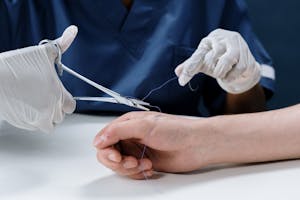In the dynamic and bustling environment of a college campus, unforeseen accidents can occur, leaving individuals injured and in need of guidance. Whether it’s a slip and fall, a sports-related mishap, or any other form of injury, knowing the right steps to take is not just important but crucial. This comprehensive guide seeks to provide a step-by-step walkthrough of what to do if you find yourself injured on a college campus.
Immediate Response
 The first moments after sustaining an injury on a college campus are undoubtedly critical. The immediate response sets the tone for the entire process and greatly influences the outcome. In the event of an injury, regardless of its apparent severity, the priority must be one’s health and safety. Seek medical attention promptly, either through on-campus health services or by dialing emergency services. This initial step is foundational, as a timely and thorough assessment by medical professionals is crucial for an accurate diagnosis and appropriate treatment plan.
The first moments after sustaining an injury on a college campus are undoubtedly critical. The immediate response sets the tone for the entire process and greatly influences the outcome. In the event of an injury, regardless of its apparent severity, the priority must be one’s health and safety. Seek medical attention promptly, either through on-campus health services or by dialing emergency services. This initial step is foundational, as a timely and thorough assessment by medical professionals is crucial for an accurate diagnosis and appropriate treatment plan.
Reporting the Incident
Once you’ve received the necessary medical attention, the next crucial step is to report the incident to the relevant authorities on campus. This often involves notifying campus security, the housing office, or other appropriate channels. Detailed documentation of the incident, including the time, date, and any contributing factors, is essential. This meticulous record may become vital if legal or insurance matters arise in the aftermath. Being thorough and precise in your report contributes to the overall clarity of the situation.
Gathering Evidence
 To fortify your position in case of any disputes or legal proceedings, it’s imperative to gather as much evidence as possible. Collect contact information from any witnesses to the incident, as their statements may provide valuable perspectives on what occurred. Inquire about the presence of surveillance cameras in the area and the possibility of obtaining footage. This visual evidence can be instrumental in establishing the sequence of events and determining liability, adding a layer of objectivity to the situation.
To fortify your position in case of any disputes or legal proceedings, it’s imperative to gather as much evidence as possible. Collect contact information from any witnesses to the incident, as their statements may provide valuable perspectives on what occurred. Inquire about the presence of surveillance cameras in the area and the possibility of obtaining footage. This visual evidence can be instrumental in establishing the sequence of events and determining liability, adding a layer of objectivity to the situation.
Understanding Campus Policies
Each college typically has specific policies and procedures in place for handling injuries on campus. Understanding these guidelines is paramount. Familiarize yourself with the protocols for reporting incidents, seeking medical attention, and documenting injuries. Failure to adhere to campus policies may not only complicate your situation but could potentially affect any future claims or legal actions. Navigating the campus’s specific rules ensures that you are taking the correct steps within the established framework.
Legal Considerations
 In instances where the injury is a result of someone else’s negligence or the college’s failure to maintain a safe environment, seeking legal counsel may be prudent. A consultation with a professional personal injury law firm can provide valuable insights into whether you have grounds for legal action. Many attorneys offer free consultations, allowing you to explore your options without an immediate financial commitment. Understanding the legal landscape and your rights as a student is an essential aspect of the aftermath of an injury.
In instances where the injury is a result of someone else’s negligence or the college’s failure to maintain a safe environment, seeking legal counsel may be prudent. A consultation with a professional personal injury law firm can provide valuable insights into whether you have grounds for legal action. Many attorneys offer free consultations, allowing you to explore your options without an immediate financial commitment. Understanding the legal landscape and your rights as a student is an essential aspect of the aftermath of an injury.
Recovery and Communication
As you navigate the aftermath of an injury on a college campus, the recovery process extends beyond the physical aspects. Stay in regular communication with relevant campus authorities and healthcare providers. Follow any prescribed treatment plans diligently and attend follow-up appointments. Document your medical expenses meticulously, as these may be recoverable in a legal claim or through the college’s insurance. This sustained communication and adherence to recovery plans contribute significantly to both the healing process and any potential future legal considerations.
Emotional Well-Being and Conclusion
 Beyond the physical recovery, it’s crucial to recognize and address the emotional toll of an injury. Seeking support from friends, family, or counseling services available on campus is a crucial aspect of the overall recovery. Remember that, as a student, you have rights, and taking the necessary steps ensures that those rights are protected. By prioritizing both physical and emotional well-being, individuals who have experienced an injury on a college campus can navigate the complexities of the situation with greater confidence and resilience, emerging stronger from the challenging experience.
Beyond the physical recovery, it’s crucial to recognize and address the emotional toll of an injury. Seeking support from friends, family, or counseling services available on campus is a crucial aspect of the overall recovery. Remember that, as a student, you have rights, and taking the necessary steps ensures that those rights are protected. By prioritizing both physical and emotional well-being, individuals who have experienced an injury on a college campus can navigate the complexities of the situation with greater confidence and resilience, emerging stronger from the challenging experience.
Being injured on a college campus is a challenging experience, but knowing how to respond and navigate the aftermath is crucial. From seeking immediate medical attention to understanding campus policies and exploring legal options, this guide aims to empower individuals to take the necessary steps toward recovery. By prioritizing both physical and emotional well-being, those who have experienced an injury on a college campus can navigate the complexities of the situation with greater confidence and resilience.